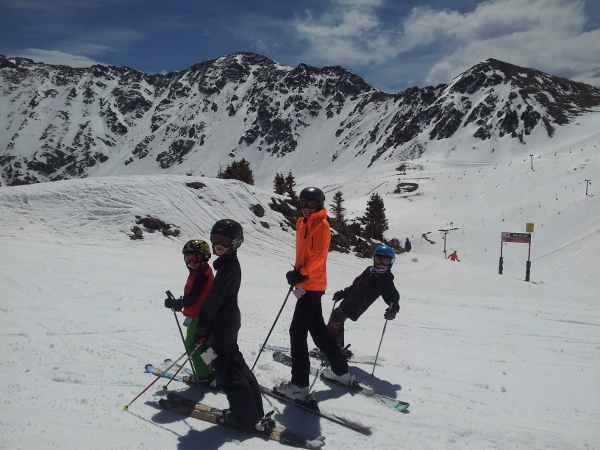Widgetized Section
Go to Admin » Appearance » Widgets » and move Gabfire Widget: Social into that MastheadOverlay zone
Record corporate profits headline DNC as Colorado AG targets groceries, Google, ad tech

As the Democratic National Convention ramps up in Chicago this week, Vice President Kamala Harris has put a spotlight on corporate greed and price gouging since the COVID-19 pandemic ravaged the U.S. economy and sparked runaway inflation that’s proven stubborn to reverse.
Harris recently announced an economic vision that will include government efforts to rein in corporate price gouging – a vision she’ll no doubt expand on during this week’s convention. Record corporate profits since the pandemic have alternately been blamed for the individual economic uncertainty stoked by inflation and praised for preventing a much worse recession.

Late last month, in a wide-ranging phone interview, RealVail.com asked Colorado Attorney General Phil Weiser, an elected Democrat and former anti-trust attorney in the U.S. Justice Department, about some of the very issues Harris will be trying to tackle this week.
In Colorado, arguably the nation’s foremost ski and outdoor recreation state, Weiser would not directly address the Justice Department’s review of Denver-based Alterra Mountain Company’s attempted acquisition of Arapahoe Basin ski area in Summit County. Notably, Weiser was working in the DOJ’s anti-trust division when the DOJ required Vail to spin off A-Basin back in the 90s after it acquired Keystone and Breckenridge (Weiser actually worked on that case).
“All I can say is that consolidation in any industry that reduces competition and harm consumers is going to get my attention and I believe the Department of Justice’s attention,” Weiser said by phone on July 30. “We didn’t talk about it, but I’ll acknowledge it because it affects your region greatly. Kroger Albertson [merger attempt] is very much top of mind for me because we just secured a temporary pause on that merger and that is going to ensure we can go to trial for a full stop to that merger because we believe in communities like in Vail, this merger is harmful and would leave consumers, workers, and farmers all worse off.”
By pivoting off the ski industry to grocery biz and a proposed merger that could see less grocery competition between Safeway and City Market in West Vail, Weiser showed he’s battling for consumers. Arguably, the consolidation of the ski industry since the 90s – and fierce competition now between Alterra and Vail Resorts – has dramatically dropped the price of season ski passes.
But day ski passes purchased at the ticket window have soared to new highs, with nearly $300 now the norm. And it’s hard to see how consolidation has helped small mom-and-pop ski areas like Blue Knob, Pennsylvania, where Real Vail learned to ski – a retro throwback that’s not on a multi-pass program and is now surrounded by Vail Resorts ski areas.
Asked to compare consolidation in the ski industry that’s shutting down small resorts to the enormous power of tech giants such as Alphabet (Google) and Meta (Facebook) that has proven so costly to small publishing companies and newspapers across the country, Weiser had this to say: “We’ve got a case against Google that’s we’re going to hopefully win on liability soon, and we’ll be going to the remedy stage. We have another case against ad tech that’s moving ahead for trial, so we’re on the case.”
Weiser led a bipartisan coalition of 38 attorneys general in filing a lawsuit seeking to end what they deemed “Google’s illegal monopoly in the search market.” Less than a week after Weiser’s RealVail.com interview, Google lost the antitrust case brought by the DOJ over the company’s search dominance, prompting this email statement from Weiser on Aug. 5:
“I am pleased that Judge Mehta concluded that Google has abused its monopoly power and harmed consumers in the internet search marketplace. This case involved a remarkable level of collaboration between the states and the Justice Department, which will continue as the judge considers how to address these harms. We are committed to protecting competition that will benefit consumers and drive continued innovation in the internet.”
In another case with local ties, Weiser pointed to rail consolidation in the 90s as a factor curtailing competition and perhaps impacting safety and staffing. In the case of the Union Pacific-Southern Pacific merger of the mid-90s, he said the Justice Department specifically raised anti-competitive issues, only to be ignored by the U.S. Surface Transportation Board.
That merger led to the Tennessee Pass rail line bisecting Eagle County becoming dormant without ever officially being declared “abandoned”.
David O. Williams
Latest posts by David O. Williams (see all)
- As federal debt surges, Colorado Dems say no to Trump tax plan, Medicaid cuts - March 8, 2025
- The O. Zone: Riding that train, high on disdain for Trump’s treatment of Ukraine - March 3, 2025
- Crypto community comes together in Colorado as winds of regulatory change shift under Trump - February 28, 2025


